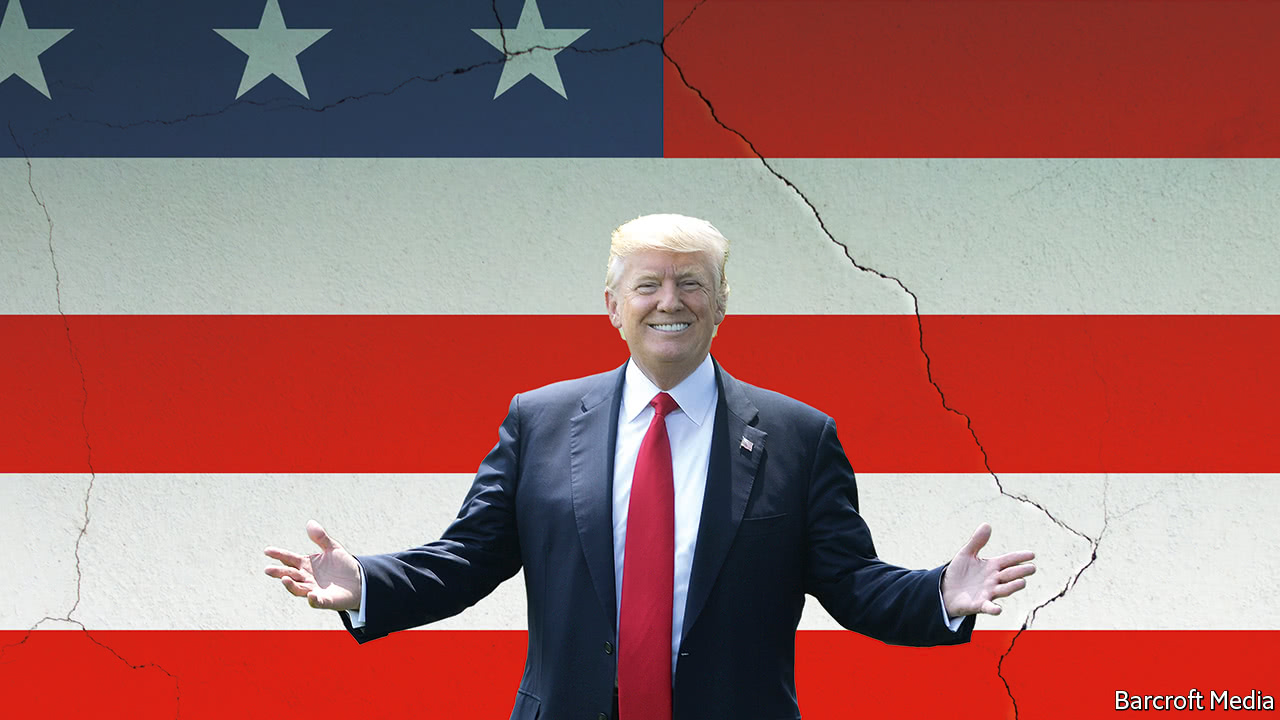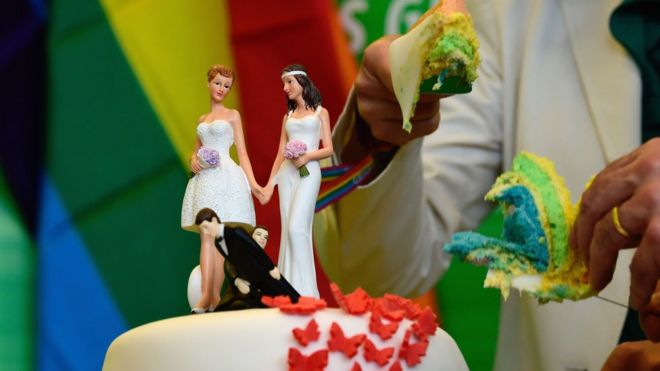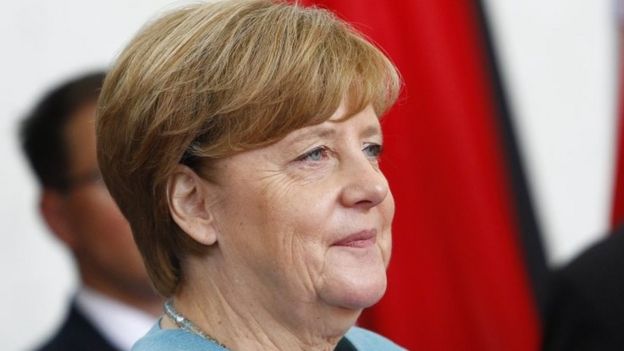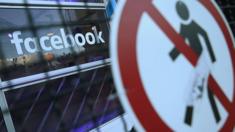Donald Trump’s Washington is paralysed
And the man in the Oval Office is making a bad situation worse
JULY 4th ought to bring Americans together. It is a day to celebrate how 13 young colonies united against British rule to begin their great experiment in popular government. But this July 4th Americans are riven by mutual incomprehension: between Republicans and Democrats, yes, but also between factory workers and university students, country folk and city-dwellers. And then there is President Donald Trump, not only a symptom of America’s divisions but a cause of them, too.
Mr Trump won power partly because he spoke for voters who feel that the system is working against them, as our special report this week sets out. He promised that, by dredging Washington of the elites and lobbyists too stupid or self-serving to act for the whole nation, he would fix America’s politics.
His approach is not working. Five months into his first term, Mr Trump presides over a political culture that is even more poisonous than when he took office. His core voters are remarkably loyal. Many businesspeople still believe that he will bring tax cuts and deregulation. But their optimism stands on ever-shakier ground. The Trump presidency has been plagued by poor judgment and missed opportunities. The federal government is already showing the strain. Sooner or later, the harm will spread beyond the beltway and into the economy.
Mr Trump has also fuelled the mistrust. He has correctly identified areas where America needs reform, but botched his response—partly because of his own incontinent ego. Take tax. No one doubts that America’s tax code is a mess, stuffed full of loopholes and complexity. But Mr Trump’s reform plans show every sign of turning into a cut for the rich that leaves the code as baffling as ever. So, too, health care. Instead of reforming Obamacare, Republicans are in knots over a bill that would leave millions of Mr Trump’s own voters sicker and poorer.
Institutions are vulnerable. The White House is right to complain about America’s overlapping and competing agencies, which spun too much red tape under President Barack Obama. Yet its attempt to reform this “administrative state” is wrecking the machinery the government needs to function. Mr Trump’s hostility has already undermined the courts, the intelligence services, the state department and America’s environmental watchdog. He wants deep budget cuts and has failed to fill presidential appointments. Of 562 key positions identified by the Washington Post, 390 remain without a nominee.
As harmful as what Mr Trump does is the way he does it. In the campaign he vowed to fight special interests. But his solution—to employ businesspeople too rich for lobbyists to buy—is no solution at all. Just look at Mr Trump himself: despite his half-hearted attempts to disentangle the presidency and the family business, nobody knows where one ends and the other begins. He promised to be a dealmaker, but his impulse to belittle his opponents and the miasma of scandal and leaks surrounding Russia’s role in the campaign have made the chances of cross-party co-operation even more remote. The lack of respect for expertise, such as the attacks on the Congressional Budget Office over its dismal scoring of health-care reform, only makes Washington more partisan. Most important, Mr Trump’s disregard for the truth cuts into what remains of the basis for cross-party agreement. If you cannot agree on the facts, all you have left is a benighted clash of rival tribes.
Those are huge strengths. But they only mitigate the damage being done in Washington. Health-care reform affects a sixth of the economy. Suspicion and mistrust corrode all they touch. If the ablest Americans shun a career in public service, the bureaucracy will bear the scars. Besides, a bad president also imposes opportunity costs. The rising monopoly power of companies has gone unchallenged. Schools and training fall short even as automation and artificial intelligence are about to transform the nature of work. If Mr Trump serves a full eight years—which, despite attacks from his critics, is possible—the price of paralysis and incompetence could be huge.
The dangers are already clear in foreign policy. By pandering to the belief that Washington elites sell America short, Mr Trump is doing enduring harm to American leadership. The Trans-Pacific Partnership would have entrenched America’s concept of free markets in Asia and shored up its military alliances. He walked away from it. His rejection of the Paris climate accord showed that he sees the world not as a forum where countries work together to solve problems, but as an arena where they compete for advantage. His erratic decision-making and his chumminess with autocrats lead his allies to wonder if they can depend on him in a crisis.
July 4th is a time to remember that America has renewed itself in the past; think of Theodore Roosevelt’s creation of a modern, professional state, FDR’s New Deal, and the Reagan revolution. In principle it is not too late for Mr Trump to embrace bipartisanship and address the real issues. In practice, it is ever clearer that he is incapable of bringing about such a renaissance. That will fall to his successor.
Mr Trump won power partly because he spoke for voters who feel that the system is working against them, as our special report this week sets out. He promised that, by dredging Washington of the elites and lobbyists too stupid or self-serving to act for the whole nation, he would fix America’s politics.
Latest updates
From sea to shining sea
America’s loss of faith in politics did not start with Mr Trump. For decades, voters have complained about the gridlock in Washington and the growing influence of lobbyists, often those with the deepest pockets. Francis Fukuyama, a political theorist, blamed the decay on the “vetocracy”, a tangle of competing interests and responsibilities that can block almost any ambitious reform. When the world changes and the federal government cannot rise to the challenge, he argued, voters’ disillusion only grows.Mr Trump has also fuelled the mistrust. He has correctly identified areas where America needs reform, but botched his response—partly because of his own incontinent ego. Take tax. No one doubts that America’s tax code is a mess, stuffed full of loopholes and complexity. But Mr Trump’s reform plans show every sign of turning into a cut for the rich that leaves the code as baffling as ever. So, too, health care. Instead of reforming Obamacare, Republicans are in knots over a bill that would leave millions of Mr Trump’s own voters sicker and poorer.
Institutions are vulnerable. The White House is right to complain about America’s overlapping and competing agencies, which spun too much red tape under President Barack Obama. Yet its attempt to reform this “administrative state” is wrecking the machinery the government needs to function. Mr Trump’s hostility has already undermined the courts, the intelligence services, the state department and America’s environmental watchdog. He wants deep budget cuts and has failed to fill presidential appointments. Of 562 key positions identified by the Washington Post, 390 remain without a nominee.
As harmful as what Mr Trump does is the way he does it. In the campaign he vowed to fight special interests. But his solution—to employ businesspeople too rich for lobbyists to buy—is no solution at all. Just look at Mr Trump himself: despite his half-hearted attempts to disentangle the presidency and the family business, nobody knows where one ends and the other begins. He promised to be a dealmaker, but his impulse to belittle his opponents and the miasma of scandal and leaks surrounding Russia’s role in the campaign have made the chances of cross-party co-operation even more remote. The lack of respect for expertise, such as the attacks on the Congressional Budget Office over its dismal scoring of health-care reform, only makes Washington more partisan. Most important, Mr Trump’s disregard for the truth cuts into what remains of the basis for cross-party agreement. If you cannot agree on the facts, all you have left is a benighted clash of rival tribes.
Til selfish gain no longer stain
Optimists say that America, with its immense diversity, wealth and reserves of human ingenuity and resilience can take all this in its stride. Mr Trump is hardly its first bad president. He may be around for only four years—if that. In a federal system, the states and big cities can be islands of competence amid the dysfunction. America’s economy is seemingly in rude health, with stockmarkets near their all-time highs. The country dominates global tech and finance, and its oil and gas producers have more clout than at any time since the 1970s.Those are huge strengths. But they only mitigate the damage being done in Washington. Health-care reform affects a sixth of the economy. Suspicion and mistrust corrode all they touch. If the ablest Americans shun a career in public service, the bureaucracy will bear the scars. Besides, a bad president also imposes opportunity costs. The rising monopoly power of companies has gone unchallenged. Schools and training fall short even as automation and artificial intelligence are about to transform the nature of work. If Mr Trump serves a full eight years—which, despite attacks from his critics, is possible—the price of paralysis and incompetence could be huge.
The dangers are already clear in foreign policy. By pandering to the belief that Washington elites sell America short, Mr Trump is doing enduring harm to American leadership. The Trans-Pacific Partnership would have entrenched America’s concept of free markets in Asia and shored up its military alliances. He walked away from it. His rejection of the Paris climate accord showed that he sees the world not as a forum where countries work together to solve problems, but as an arena where they compete for advantage. His erratic decision-making and his chumminess with autocrats lead his allies to wonder if they can depend on him in a crisis.
July 4th is a time to remember that America has renewed itself in the past; think of Theodore Roosevelt’s creation of a modern, professional state, FDR’s New Deal, and the Reagan revolution. In principle it is not too late for Mr Trump to embrace bipartisanship and address the real issues. In practice, it is ever clearer that he is incapable of bringing about such a renaissance. That will fall to his successor.




